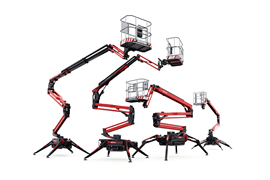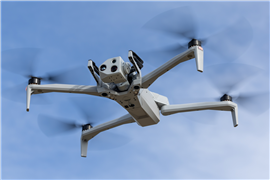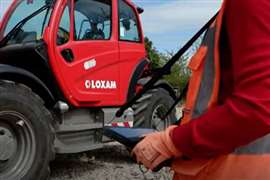Read this article in French German Italian Portuguese Spanish
Equipment theft: a global crisis
06 May 2025
Rental firms around the world are being hit by an epidemic of stealing. International Rental News editor, Lewis Tyler, looks at the figures and asks what is being done to stop it in the US, UK and Europe.
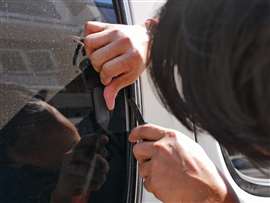 Photo: OleCNX via AdobeStock
Photo: OleCNX via AdobeStock
As dawn rose on Wednesday 5 March in the UK towns of Padiham and Burnley, police officers from Cheshire Police made a series of dawn raids searching for evidence of construction equipment stolen from rental firms.
The police executed eight warrants, arresting a total of 10 people on suspicion of stealing around £700,000 (€834,904) worth of tools and machinery as part of an investigation conducted in partnership with the National Construction and Agriculture Theft Team (NCATT) and Lancashire Rural Crime officers.
Six men and four women were arrested on suspicion of conspiracy to commit theft and fraud following incidents in Cheshire, Cumbria, Humberside, West Midlands, Lancashire, Hertfordshire, Avon and Somerset, Staffordshire, Merseyside, Derbyshire, North Yorkshire, West Mercia and Lincolnshire.
Detective sergeant Graeme Carvell, of Ellesmere Port CID, who led the operation, said, “Through our investigation we believe that those involved have been using false identifications in order to hire out plant equipment with no intent of ever returning the machines.
“I hope that the arrests provide reassurance to the business community, demonstrating that we take reports of this nature seriously.”
The raid is just one example of an increasingly sophisticated epidemic of machinery and tool theft focused on rental firms, with criminals often targeting specific machine types and using tactics that bypass immobilisers or tracking devices.
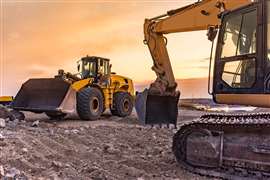 Photo: Henry Saint John via AdobeStock
Photo: Henry Saint John via AdobeStock
Once equipment leaves a rental yard or job site with a fraudulent renter or thief, it is rarely recovered and is often sold on the black market or to unsuspecting buyers online.
In the US, for example, American Rental Association (ARA) estimates that equipment theft costs the rental industry around $100 million per year, with more than 360 machines vanishing each month.
“Equipment theft is an issue that affects every single one of our equipment rental members, no matter the size of their operation,” said ARA CEO Tony Conant.
In Europe too, French rental association DLR reports a marked increase in theft and identity fraud since the pandemic.
“All generalist equipment is targeted,” Joël Fruchart, president of the DLR rental commission, told IRN. “But tracked excavators from 2.5 to 6 tonnes are by far the most frequently stolen. We’re also seeing an upsurge in thefts of generators and telehandlers.”
DLR believes the war in Ukraine and the embargo on Russia have increased demand for stolen equipment — a view shared by French law enforcement.
The statistics are just as stark in the UK, where research by branding specialists Monster Mesh, drawing on data from 32 of 45 police forces, revealed that £94 million (US$125 million) worth of tools were stolen in the past year – mostly from vans.
Those figures have seen public pressure for tougher laws increase – especially to protect self-employed tradesmen.
On 3 February 2025, UK campaign group Trades United held a van rally in Westminster, urging government to address what it called an “epidemic” of tool theft and the resale of stolen tools at car boot sales and markets.
Shoaib Awan, founder of Trades United and owner of The Gas Expert, said, “Tool theft numbers are rising year on year, and not enough is being done by the government to protect the trades. A crime reference number is not acceptable. We need strict enforcement and a crackdown operation with immediate effect.”
Tougher sentences
Currently, organised thefts often result in minimal sentencing. To change that, the Theft of Tools of Trade (Sentencing) Bill, proposed by Amanda Martin, Labour MP for Portsmouth North, is aiming to reclassify tool theft as a crime causing “significant additional harm,” which would allow for harsher penalties.
Martin has been actively rallying support for the bill, which proposes custodial sentences of up to two years for offenders.
As the second reading approaches (scheduled for July), there is growing advocacy for the bill to be expanded to include tools and equipment stolen from rental businesses, which face similar challenges in recovering stolen goods.
The issue has also been recognised across the political spectrum. Shadow Home Secretary Chris Philp referred to tool theft as a “massive problem for the industry” and suggested that police should make better use of technologies like facial recognition from dashcams and CCTV.
He said that relying on insurance claims is not a long-term solution, as it drives up premiums for everyone.
So what can rental firms do to prevent falling victim to theft?
Tackling equipment theft
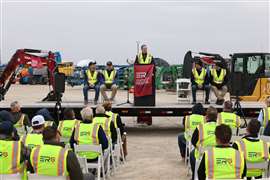 American Rental Association CEO Tony Conant introduces Equipment Rental Guard Program aimed at preventing equipment theft.
American Rental Association CEO Tony Conant introduces Equipment Rental Guard Program aimed at preventing equipment theft.
In response to the growing crisis in the US, the ARA has launched the Equipment Rental Guard programme, a wide-ranging initiative aimed at theft prevention and recovery.
Unveiled at a press conference at Ritchie Bros. Auctioneers in Illinois earlier this year, the program is designed to give rental businesses the tools they need to identify risks and thwart theft.
In additional to raising awareness of the issue, the programme also includes training courses, red flag renter text alerts, a national database of problematic renters and stolen equipment and ID verification.
Theft reporting guidance, financial security tools and free legal assistance are also available through the programme.
“We wanted to attack it from every angle,” the ARA’s Conant said. “When used to its fullest potential, our members will be totally prepared to prevent thieves from stealing their equipment.”
Law enforcement experts at the event provided critical guidance on quickly and effectively reporting equipment theft, while rental companies shared firsthand accounts to highlight the scale of the threat.
David Skala, manager at B.I. Rental in Illinois, added, “This problem is so huge that unless every individual who is involved takes action, there’s not going to be any movement forward. I think all the tools that ARA is introducing are absolutely fantastic, and I’m looking forward to implementing them in our store.”
Meanwhile, in France DLR is spearheading a similarly ambitious program to tackle the problem through its Stop Thefts commission, launched in 2023.
Fruchart told IRN the initiative was born after a roundtable at the DLR Career Day revealed a shared sense of urgency; “It became clear to all the participants that it was necessary to create a commission dedicated to this scourge.”
DLR moved quickly in early 2024 to establish a structured response. It coordinated with law enforcement agencies, insurance federations, equipment distributors, and customers to form a focused task force of under 20 members.
It has since signed partnership agreements with French police and gendarmerie forces and helped conduct operational training on equipment identification at rental sites.
DLR’s approach includes both short-term actions and longer-term ambitions. In early 2025, the commission released a security prevention guide and rolled out a programme of regional training sessions.
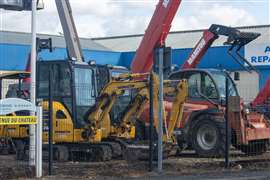 Photo: Adobe Stock
Photo: Adobe Stock
It also plans to enhance its internal alert system for theft reports — a measure that has already contributed to the recovery of stolen assets.
A new tool developed with police forces will soon help rental companies file theft reports using terminology aligned with law enforcement databases, improving the chances of recovery.
Crucially, DLR sees communication and collaboration as fundamental. “Our desire is to broaden the commission to all players in the equipment chain,” said Fruchart. “There is strength in numbers.”
DLR is also keen to coordinate with European partners, including the European Rental Association, to take the fight against theft beyond France’s borders.
The technological approach to theft prevention
As theft rates climb, the demand for tamper-resistant solutions is growing.
Manufacturers and security specialists are developing smarter technologies, from GPS tracking and geofencing to physical immobilisers, aimed not just at recovery, but prevention through deterrence and early intervention.
Italy-based Mechinal Line Solutions is one such company responding. It offers a range of products to prevent theft and monitor vehicles in real time, including the MLS W 020 hydraulic mechanical anti-theft system, which is now in use in the UK market.
The company works with rental companies across the world to protect equipment (IRN was asked not to name client companies, to avoid compromising system security).
Yet Dario Bartesaghi, president of Mechinal Line Solutions, says that OEMs are often reluctant to include theft prevention systems by default.
“The producers are not trying to find a solution. It’s more the rental customer or the end user that wants to be protected,” he says.
“To effectively address the issue of equipment theft, the global rental industry must take a proactive approach, focusing on prevention rather than simply relying on reactive solutions.
“The key is to fit protective systems that actively prevent theft before it occurs. While satellite tracking systems can be valuable in locating stolen equipment, they should not be seen as an anti-theft solution.
“Tracking a vehicle after it has already been stolen is certainly useful, but it is far more effective to prevent the theft from happening in the first place.”
Meanwhile, Alastair MacLeod, CEO of Ground Control, says that the future of equipment tracking is becoming increasingly intertwined with IoT-enabled solutions.
He says the systems go beyond just location tracking, providing real-time telemetry data, including fuel consumption, tire pressure, and service alerts, helping businesses not only prevent theft but also improve fleet efficiency.
Geo-fencing capabilities, for example, enable managers to set virtual boundaries for their assets.
If equipment moves outside its designated area, an immediate alert is triggered, enabling rapid response to potential thefts. This proactive monitoring is particularly useful on large job sites or in regions with high theft risks.
At the same time, he says that satellite IoT tracking is increasingly relevant for construction and rental companies operating on a global scale. Unlike traditional systems reliant on cellular networks, satellite-enabled IoT can track equipment anywhere, including remote and off-grid areas.
This technology is also becoming more affordable, he says. By using low-power sensors and small satellite-enabled devices, companies can track assets with minimal overhead costs, while the scalability of the systems means they can be applied to fleets of all sizes, allowing businesses to start with critical assets and expand as needed.
In addition to its effectiveness, satellite IoT offers comprehensive visibility and control over assets. These systems collect and transmit data in real time to centralised cloud platforms, enabling users to analyse historical data, track asset conditions, and manage resources more effectively.
STAY CONNECTED



Receive the information you need when you need it through our world-leading magazines, newsletters and daily briefings.
CONNECT WITH THE TEAM










